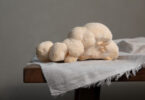Local dietitian Gale Pearson teaches people more about what they can eat, not what they can’t
Written by Alison Johnson
—
[dropcap]A few things come with the territory for nutrition experts: people ask lots of questions about different diets, they watch what you’re eating and they often apologize for what’s on their plates. Gale Pearson, a registered dietitian for 29 years, considers the latter none of her business but embraces all of the rest. [/dropcap]“I look at it as another opportunity to educate,” she says. “The answer I give about diets is, ‘They work while you are on them!’”
As a dietitian and certified diabetes educator with Tidewater Physicians Multispecialty Group, Pearson’s job is to help clients develop eating plans they can stick with for life. That usually involves taking some foods out and adding others in, such as increasing soluble fiber and reducing fat to lower cholesterol or using healthy carbohydrates to control blood sugar.
“All people hear is what they shouldn’t eat, instead of all the foods they can and should eat,” says Pearson, who practices in Newport News and Williamsburg. “It may not be what you are eating that is a problem, but what you are not eating.”
Growing up on a farm in King and Queen County, Pearson developed an early taste for many fruits and vegetables and keeps her refrigerator stocked with fresh produce and low-fat dairy products. But she also has favorite indulgences, including a daily serving of tortilla chips and a fun-sized Baby Ruth candy bar a few times a month.
With her clients, Pearson focuses on gradual changes and clearing up food myths. Many people think they have to omit entire food groups, eat foods they don’t like or eat the same items over and over. “They believe that foods are ‘good’ or ‘bad’—if you eat a ‘good’ food you can eat all you want, and if you eat a ‘bad’ food you should feel guilty,” Pearson says. “This ignites fear of food, blaming food and using food to feel better.”
Pearson, 54, decided to study nutrition after a high school guidance counselor saw her high marks in science and suggested it as an alternative to nursing. She earned undergraduate and master’s degrees in nutrition and dietetics from Hampton University and Howard University, respectively.
Pearson’s top tip for anyone looking to eat healthier is to use the “plate method”: fill two-thirds of a plate with fruit, vegetables and whole grains, and the other third with lean protein. Delaying eating or skipping meals, she adds, usually leads to unhealthy food choices and overeating.
People have many misconceptions about foods, Pearson has found. Just a couple: the word “natural” on labels isn’t a regulated term and doesn’t always mean “healthy”; and most of the sodium in the American diet comes from processed foods, not the salt shaker. As for foods that people think are nutritious but aren’t, Pearson puts butter (high in saturated fat), honey wheat bread (not whole grain just because it isn’t “white”) and turkey bacon (high in sodium) high on her list.
A Newport News resident, Pearson is a married mother of two sons, ages 22 and 17, and loves to cook; she tries at least two new recipes a month and usually eats out just once a week. She finds joy in guiding others to goals such as lowering cholesterol, reducing medication and dropping pounds. “People will always be busy, think they can’t afford it, be too tired or not have time,” she says. “I help them move beyond these real issues, ease their frustrations and develop strategies that work for them.”


